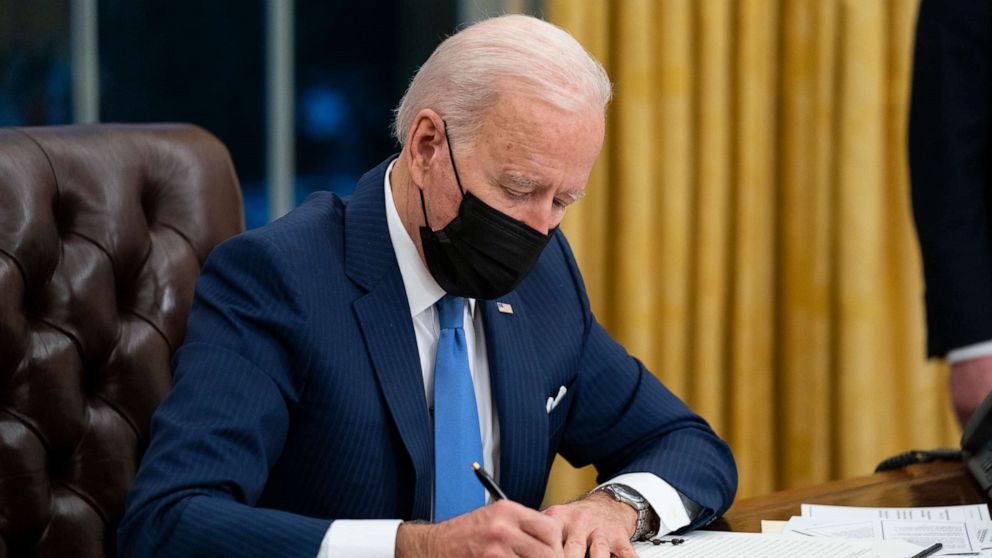Democrats to introduce Biden’s immigration reform bill
Democrats on Capitol Hill Thursday will introduce their version of immigration reform legislation, which essentially consists of a roundup of immigration priorities President Joe Biden laid out on day one of his administration.
The reform proposal is so far the most ambitious effort to counteract the Trump administration’s hardline border policies.
Certain elements have already been floated in Congress and the Biden administration has signaled a willingness to break up their reform effort into parts. But those involved with the legislation insist they’re committed to a single legislative push for now.
PATHWAY TO CITIZENSHIP
The U.S. Citizenship Act of 2021 would create an eight-year path to citizenship for the 11 million undocumented people in the country. First, it would provide them with a new type of temporary status for five years and then allow them to obtain citizenship after another three years.
Deferred Action for Childhood Arrivals recipients, people who qualify for Temporary Protected Status from countries suffering from war and natural disasters, and farm workers who can prove they have a work history essentially get bumped to the front of the “green card” line provided they pass background checks and meet other requirements.
The path to citizenship only applies to people who have been in the country since Jan. 1, 2021. Anyone who entered the country illegally after that date would not qualify.
BORDER BACKLOG
The bill provides funding for more immigration judges and support staff to help with the backlog of asylum seekers. The immigration court backlog has hit record highs in recent years as the Trump administration put added pressure on judges to adjudicate the high volumes.
The bill also provides funding for lawyers to represent minors and other vulnerable groups, a move that also makes it more statistically likely for migrants to finish out the court process.
Removing factors that spur people to migrate is also a major aim of the legislative push, with $4 billion over four years dedicated to improving conditions and reducing corruption in places that are common origins of migration.
It tries to prevent people from taking the dangerous journey north by setting up refugee processing centers in Central America. The bill also expands transnational gang task forces in the region.
BORDER SECURITY
The bill provides for increased security at ports of entry focused on detecting drugs and other contraband.
Existing criminal penalties for unauthorized immigrants remain in place, including those that bar certain criminals from obtaining green cards.
“We feel like the law is already there, no need to have added enforcement mechanisms,” said one senior administration official who spoke with ABC News on the condition of anonymity to discuss plans for the proposal.
Under existing law, anyone convicted of an aggravated felony or a crime involving illegal narcotics is not admissible in the U.S.
ADDITIONAL CHANGES
Counties and municipalities will be able to petition for additional work visas as needed under the reform bill.
The bill would remove the word “alien” in the immigration code and replace it with “noncitizen.” This move has been applauded by immigrant advocates who see the use of the word as derogatory and dehumanizing.
It would also end the three and 10-year bans on reentry for undocumented immigrants who voluntarily leave the country.
The bill also reforms legal immigration processes by no longer counting spouses and minor children against a country’s share of allotted visas. It also means LGBTQ+ partnerships would be treated equally under the Immigration and Nationality Act, according to one administration official.
Separately, the number of diversity visas issued for countries with low rates of immigration to the U.S. will increase from 55,000 to 80,000.
THE POLITICS
This is not a bipartisan bill, which the White House concedes. It’s expected to be introduced by two Democrats, Sen. Bob Menendez of New Jersey and Rep. Linda Sanchez of California.
It does not appear that Biden and the Democrats have enough Republican support they would need to pass this in a bipartisan manner.
Unveiling an ambitious legislative proposal and actually achieving it are two very different things. Biden had a front-row seat to former President Barack Obama’s failure to deliver lasting change to the immigration system. By now making immigration reform one of his earliest legislative priorities, Biden clearly hopes to avoid the missteps of the Obama administration when immigration reform was delayed and dwarfed by other legislative priorities.
Several questions remain, including whether the legislation will become watered-down over negotiations with Republicans and whether the package will be broken into parts.
If Democrats decide to go at it alone, they could pass some form of the bill, but that move could also contradict the message of unity and bipartisanship Biden campaigned on.
Conversely, if they wait for Republican support, Congress could be looking at another failed attempt at immigration reform.
ABC News’ Ben Gittleson, Molly Nagle, Ben Siegel and Sarah Kolinovsky contributed to this report.




